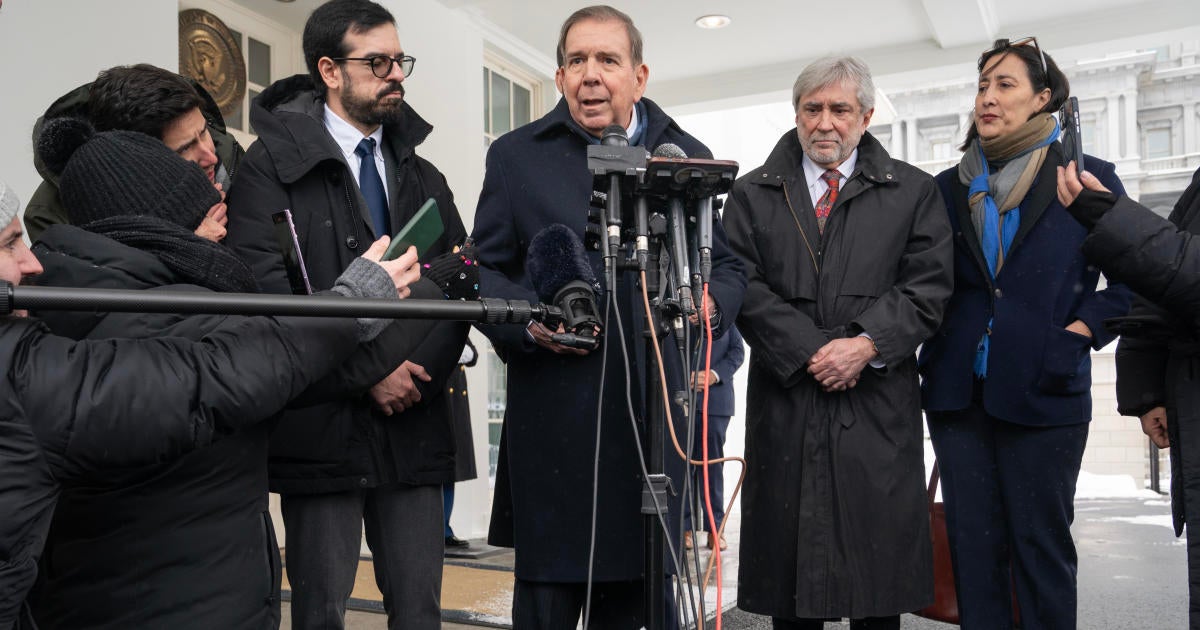President Biden met with Venezuelan opposition leader Edmundo González at the White House ahead of Venezuela’s Friday inauguration of President Nicolas Maduro for his third term after their highly-contested election, a White House official tells CBS News. The United States and many European countries have rejected Maduro’s claim of winning the election, which was certified by Venezuela’s Supreme Court in August. In November, the U.S. government recognized Venezuelan opposition candidate Edmundo González as the president-elect.
González’s White House visit is the first stop on an international tour of defiance to Venezuelan inauguration and gathering of international support. He has been living in exile in Spain since a Venezuelan judge issued an arrest warrant following the July presidential election. Venezuela’s National Electoral Council declared Maduro the election winner hours after polls closed. Electoral authorities did not provide detailed vote counts, unlike previous presidential elections.
Ahead of the elections, the United States made a bargain with the Maduro government that the U.S. would temporarily lift some sanctions on Venezuelan oil and gas in exchange for a commitment for a free and fair election. The Maduro regime did not uphold its end of the agreement and sanctions were reinstated. In September, the U.S. sanctioned 180 Venezuelan officials for not accepting the results of the election and committing human rights abuses including killings, repression, and mass detention of protesters.
President Biden’s meeting with Edmundo González underscores the ongoing political turmoil in Venezuela and the international community’s stance against Maduro’s government. The U.S. has been a vocal critic of Maduro’s regime, citing human rights abuses, election irregularities, and suppression of political dissent.
González’s visit to the White House is seen as a symbolic gesture of solidarity with the Venezuelan opposition and a reaffirmation of the U.S.’s support for democratic principles in the region. The meeting comes at a crucial juncture in Venezuela’s political landscape, with Maduro’s controversial re-election sparking widespread protests and international condemnation.
The U.S. government’s decision to recognize González as the legitimate president-elect further deepens the rift between Washington and Caracas, with the Biden administration taking a more assertive stance against Maduro’s authoritarian rule. The meeting between Biden and González is likely to send a strong message to Maduro and his allies that the U.S. stands firmly with the Venezuelan people in their quest for democracy and freedom.
The issue of Venezuela has been a longstanding point of contention in U.S.-Latin American relations, with the country’s political crisis fueling instability in the region and prompting a humanitarian exodus of Venezuelans fleeing economic hardship and political persecution. The Biden administration’s engagement with the Venezuelan opposition reflects a broader strategy to address the root causes of the crisis and support a peaceful transition to democracy in the country.
The U.S. government’s decision to sanction Venezuelan officials for their role in undermining democracy and committing human rights abuses underscores the seriousness of the situation and the need for accountability. The Biden administration has made it clear that it will not tolerate violations of democratic norms and human rights in Venezuela or anywhere else in the world.
As Venezuela prepares for Maduro’s third inauguration, the international community will be closely watching developments in the country and assessing the implications for regional stability and security. The U.S.’s engagement with the Venezuelan opposition signals a renewed commitment to promoting democracy and human rights in the region and standing up to authoritarian regimes that threaten peace and prosperity.
In conclusion, President Biden’s meeting with Venezuelan opposition leader Edmundo González at the White House is a significant development in the ongoing political crisis in Venezuela and reaffirms the U.S.’s support for democratic values and human rights in the region. The meeting sends a clear message to Maduro and his allies that the U.S. stands with the Venezuelan people in their struggle for freedom and democracy.









